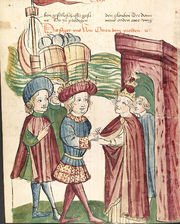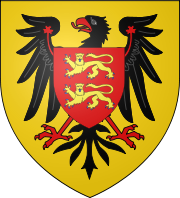Otto IV, Holy Roman Emperor


Otto IV of Brunswick (1175 – May 19, 1218) was one of two rival kings of the Holy Roman Empire from 1198 on, sole king from 1208 on, and emperor from 1209 on. The only king of the Welf dynasty, he was deposed in 1215.
Otto was the son of Henry the Lion, Duke of Bavaria and Saxony, and Matilda Plantagenet. His exact birthplace is not given by any original source[1]
He grew up in England in the care of his grandfather King Henry II. Otto became a friend of Richard I of England, who attempted to make him Earl of York, and, through marriage, king of Scotland. Both attempts failed, and so in 1196, he was made Count of Poitou. He participated in the war against France on the side of Richard.
After the death of Emperor Henry VI, some of the princes of the Empire elected his brother, Philip, Duke of Swabia, king in March 1198. The papacy, under Innocent III, seized the opportunity to extend its sway at the expense of the vulnerable empire and proceeded to move heaven and earth on behalf of Otto, whose family had always been opposed to the house of Hohenstaufen. Otto himself also seemed willing to grant any demands that Innocent would make. Those princes opposed to the Staufen dynasty also decided, on the initiative of Richard of England, to elect instead a member of the House of Welf. Otto's elder brother, Henry, was on a crusade at the time, and so the choice fell to Otto. The papal favorite, soon recognized over the whole empire, was elected king by the princes of northern Germany in Cologne on June 9, 1198. Otto took control of Aachen, the place of coronation, and was crowned by Adolf, Archbishop of Cologne, on July 12, 1198. The coronation was done with fake regalia, because the actual materials were in the hands of the Staufen.
Otto's election pulled the empire into the conflict between England and France, since Philip allied himself with France, and Otto was being supported by England. In 1200-01, Innocent announced that he recognized Otto as the only legitimate king. In return, Otto promised to support the pope's interests in Italy. In the following years, Otto's situation worsened because after England's defeat by France he lost England's financial support. Many of his allies changed sides to Philip, including his brother Henry. Otto was defeated and wounded in battle by Philip on July 27, 1206, near Wassenberg, and as a consequence also lost the support of the pope. Otto was forced to retire to his possessions near Braunschweig.
However, Philip was murdered two years later, on June 8, 1208. After Philip's death, Otto made amends with the Staufen party and became engaged to Philip's daughter Beatrix. In an election in Frankfurt on November 11, 1208, he gained the support of all the electoral princes. He was crowned emperor by Pope Innocent on October 4, 1209.
Contradicting his earlier promises, Otto worked to restore imperial power in Italy and was excommunicated by the pope for this in 1210. In 1211, he tried to conquer Sicily, which was held by the Staufen king Frederick Roger. While Otto was in southern Italy, several princes of the empire, at the instigation of King Philip II of France and with the consent of the pope, elected Frederick Roger king at the Diet of Nuremberg. Otto returned to Germany to deal with the situation. After Beatrix died in the summer of 1212, and Frederick arrived in Germany with his army in September 1212, most of the former Staufen supporters deserted Otto for Frederick. On December 5, 1212, Frederick was elected king for a second time by a majority of the princes. However, Frederick did not manage to defeat Otto until 1214, when Otto, who was allied with King John of England, decisively lost the Battle of Bouvines (July 27, 1214) to the forces of Philip II of France.
Otto was forced again to withdraw to his private possessions around Brunswick. His death, at Harzburg castle on May 19, 1218, was described by historian Kantorowicz as gruesome: "deposed, dethroned, he was flung full length on the ground by the Abbot, confessing his sins, while the reluctant priests beat him bloodily to death. Such was the end of the first and last Welf Emperor."[2]
He is entombed in the Brunswick Cathedral.
Family
Otto was related to ever other King of Germany. He married twice:
- 1209 or 1212 to Beatrice (1198–1212), daughter of the German King Philip and Irene Angelina.
- May 19, 1214, in Aachen to Marie (died 1260), daughter of Henry I, Duke of Brabant, and Maud of Boulogne.
He had no children from either Beatrice or Marie.
References
![]() Chisholm, Hugh, ed (1911). "Otto IV". Encyclopædia Britannica (Eleventh ed.). Cambridge University Press.
Chisholm, Hugh, ed (1911). "Otto IV". Encyclopædia Britannica (Eleventh ed.). Cambridge University Press.
|
Otto IV, Holy Roman Emperor
House of Welf
Died: May 19 1218 |
||
| Regnal titles | ||
|---|---|---|
| Preceded by Henry VI |
King of Germany (formally King of the Romans) 1198–1215 (contested by Philip of Swabia until 1208 and Frederick II since 1212) |
Succeeded by Frederick II |
| Preceded by Henry VI |
King of Italy 1208–1215 |
Succeeded by Frederick II |
| Preceded by Henry VI |
Holy Roman Emperor Holy Roman Emperor |
Succeeded by Frederick II |
|
||||||||||||||
|
|||||||||||||||||||||||||||||||
|
|||||||||||
.svg.png)
